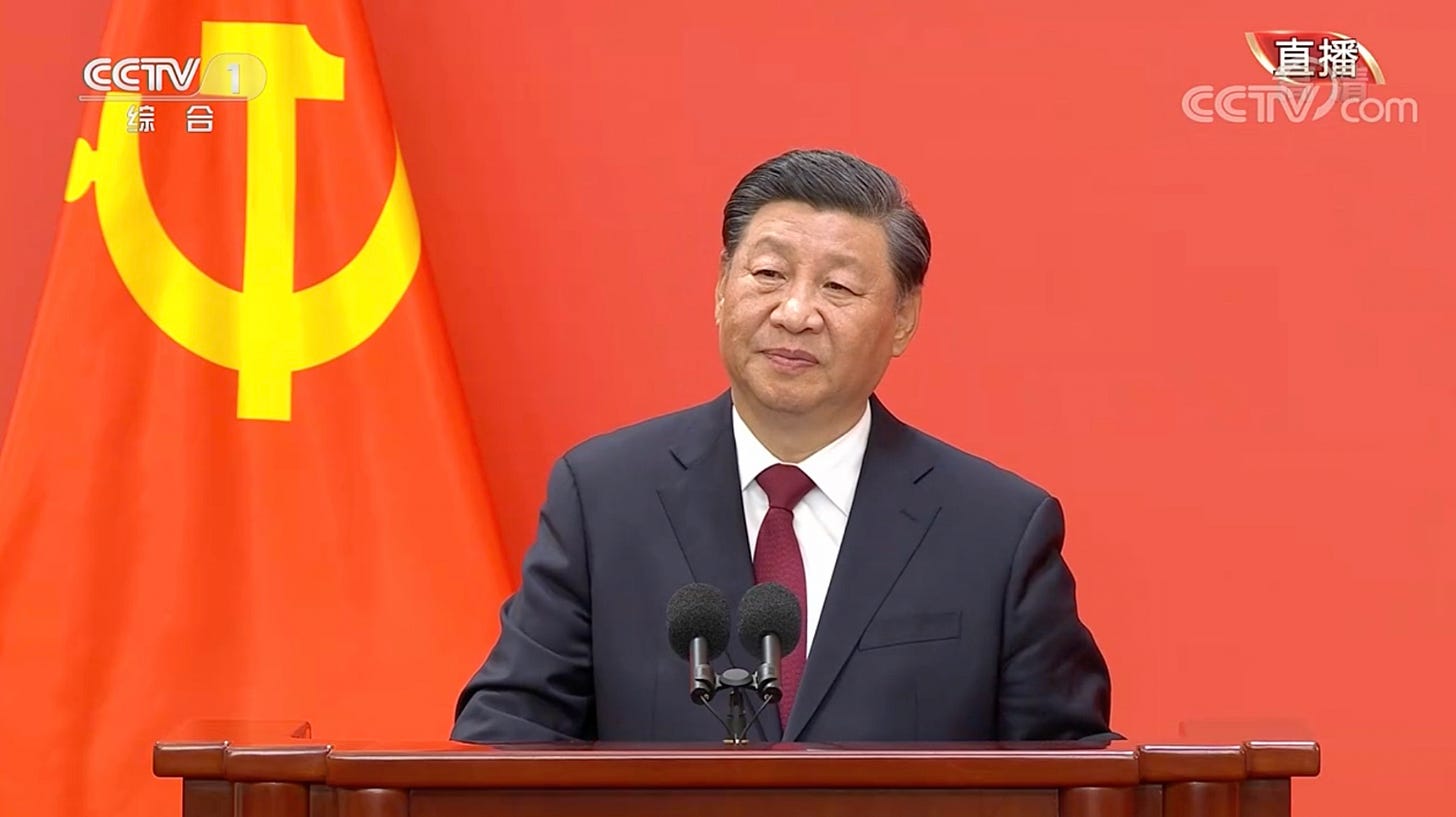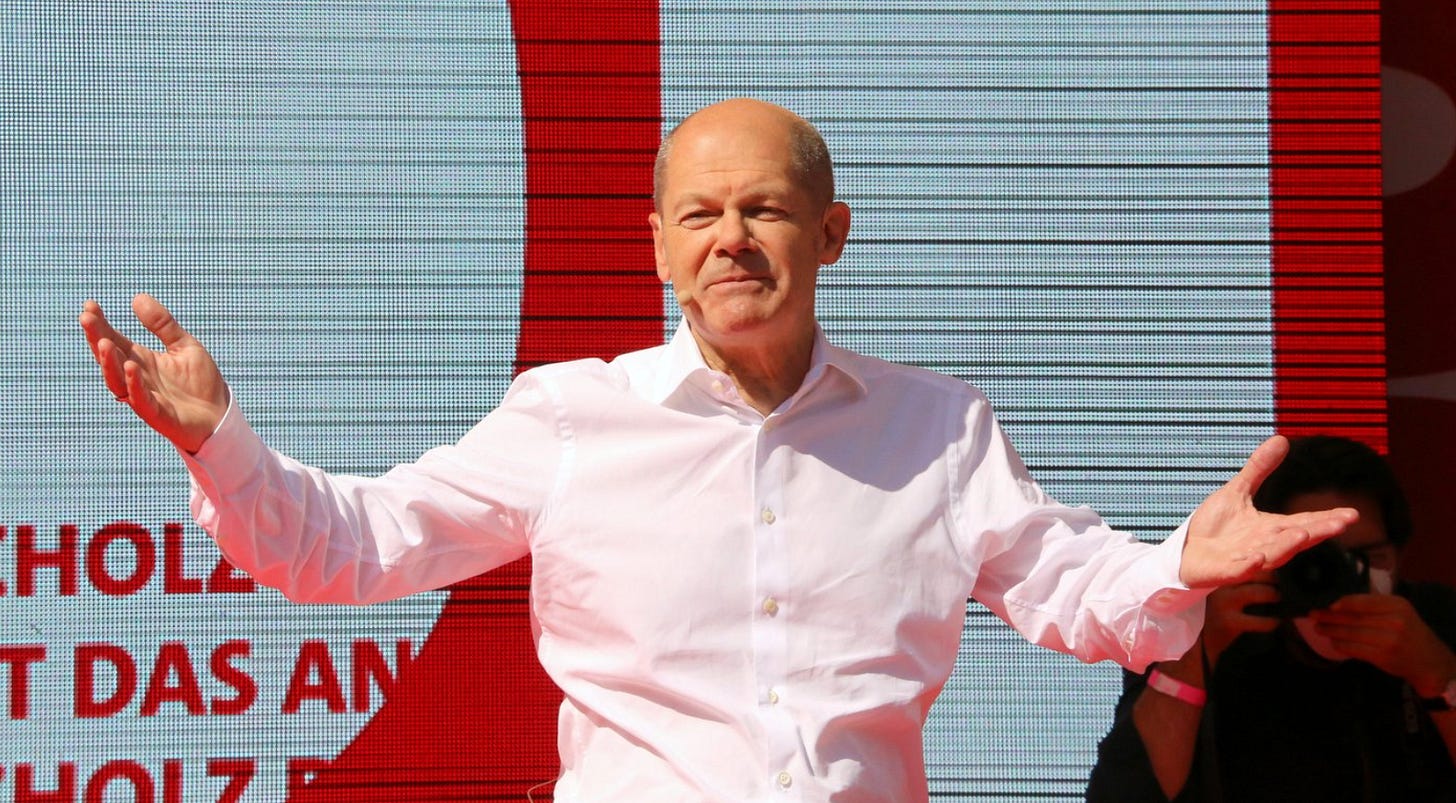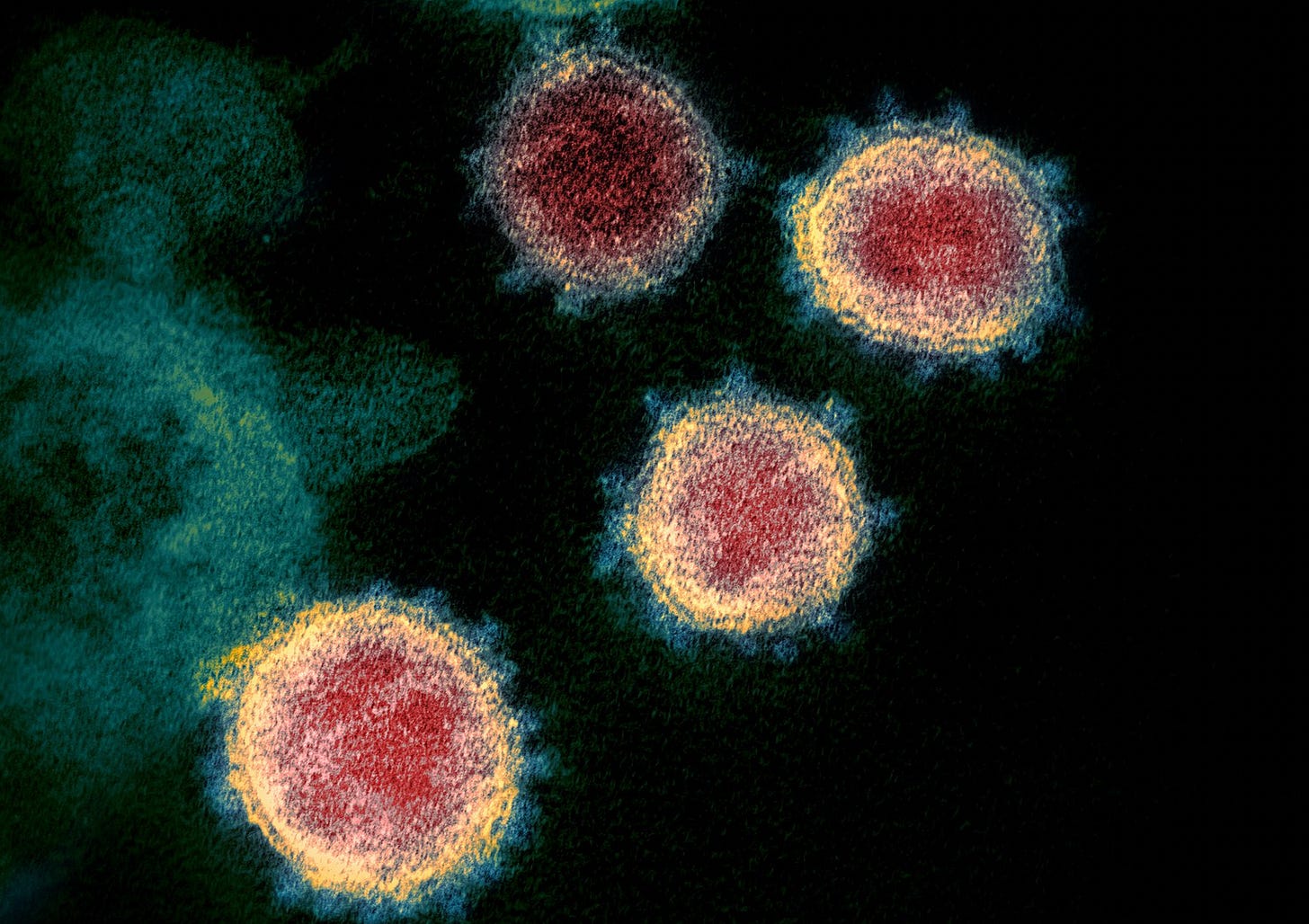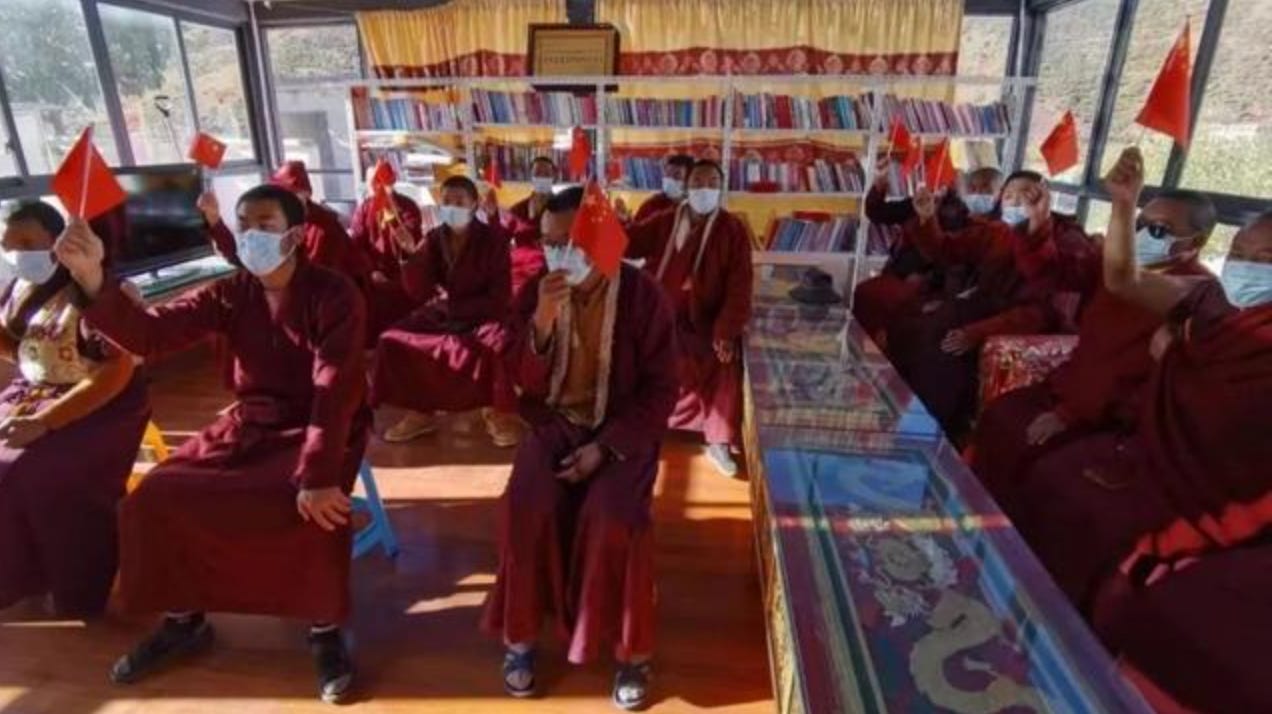Loyally yours
China's newly appointed dream team is a 'sect of Xicophants;' the general secretary's only real enemies now are abroad.
Hu’s your Daddy? Photo: Screen grab via China Media Project.
It’s a wrap on the big Beijing conclave for another five years, and everyone can finally stop speculating that Xi will “inevitably” get a third term.
He got it.
He got everything he wanted, apparently. The apex of the Party pyramid is now crowned by a tiny clique of “protégés and allies,” as various media sources describe them – a “sect of Xicophants,” men in suits with dyed jet-black hair (one exception, Cai Qi, a Hokkien-accented, hoarse-voiced, proudly-grey Xi loyalist).
A brotherhood, perhaps, committed to Xi’s so-called Marxist-informed new world order.
And no women represented among 24 Politburo members; just five in the 204 Central Committee members:
The standing committee has a couple of surprises for those who’d neglected to polish their crystal balls, but they’re not really all that surprising given Xi clearly prioritizes loyalty over merit.
They are Li Qiang, who many thought would be ushered into the sidelines for his mismanagement of the Shanghai lockdown earlier this year, and Wang Huning – prophet, seer, Xi’s intellectual mentor – whom some media sources claimed was on the way out.
Both survived and are in.
Yale historian Taisu Zhang tweeted ahead of the announced new lineup: “I’m trying to think of the last time I waited for a political outcome with this level of anxiety and barely suppressed dread. American elections don’t have this effect on me, and past Chinese power shuffles didn’t quite measure up.”
After the announcement:
Craig Singleton, a senior China fellow at the Foundation for Defense of Democracies, writing for Foreign Policy, describes these developments – a complete mop up by Xi – as a blessing in disguise “by taking the guesswork out of China’s path forward.”
It won’t. Everyone’s guessing what really happened to Hu Jintao; we’ll be on tenterhooks about China’s next moves on Taiwan. We’re still trying to guess where the latest economic data are – see below.
Xi’s black box is is more impervious to light and scrutiny than anything that preceded it.
Singleton observes:
The formal extension of Xi’s tenure locks in China’s current policy orientation—one that is unabashedly hostile to political pluralism and free market forces. Indeed, for the last few years, Xi has outlined, often in excruciating detail, his desire not only to deepen the party-state’s influence over China’s economy and 1.4 billion citizens but also to extend that influence far beyond China’s borders. Rarely has a geopolitical rival so unambiguously telegraphed his plans. Yet the Western world remains woefully unprepared for the coming “decisive decade” in its rivalry with China, as U.S. President Joe Biden described it last week.
This is perhaps so – it’s a spin at least – but what’s now official is that by empowering China, we’ve created a monster that some reasonable folk will argue we need to engage with in the form of dialogue so no one gets burned, and others will argue we need to “engage and cage” before everything gets burned.
The Hu Jintao – Xi’s predecessor and elder – incident? Bad health or otherwise: “This way off the stage, sir” was probably meant for foreign consumption, taking place just as the foreign press entered the Great Hall of the People, even though Chinese TV viewers got to see Hu’s empty seat on evening TV.
It sends two messages – obliquely, but it delivers them all the same:
I, Xi, am in charge; and you’ll never entirely divine what I’m thinking and plotting behind closed doors.
It’s the age-old power trip of sowing confusion: You have no idea what I’m about to do next.
In this case, the removal of Hu might be seen as the final full stop on factionalism and consensus building and the beginning of a new chapter involving a purpose-driven China headed by a singe nationally adored helmsman.
Now we can all start preparing for what’s next. Xi has eradicated all enemies at home; troublesome elements abroad are next on the agenda.
Meanwhile, let’s not forget …
Still no news on that missing economic data that measures the nation’s economic health, reports the Wall Street Journal.
‘I can’t think of a reason for that kind of unpredictability,’ said Alicia García-Herrero, chief economist for Asia Pacific at Natixis, a French investment bank. ‘It has already hurt China’s credibility …’
Perhaps Xi will make it permanent to keep us on our guesswork feet. It’s more likely that the latest power reshuffle is resulting in a backlog of delayed routines – in this case, especially if the data are particularly bad, which they’re likely to be.
Breaking: 3Q GDP growth was released Monday morning, China time – 3.9% up, above most expectations. More in the Wednesday ChinaDiction.
It’s not just about ‘reunification’
Fine-looking place ruined by free thinking and democracy, but that can be fixed. Photo: Hugo_ob; PixaBay.
To repeat the headline, No, it’s not just about “reunification” writes the China Daily.
It is about Taiwan residents identifying with the Chinese nation and Chinese culture.
Based on over 20 years of governing experience in the Hong Kong and Macao special administrative regions after their return to the motherland, the complete national reunification requires social and cultural integration of the two sides of the Straits.
No oracle-bone deciphering required here: all that plurality, diversity and vibrant democracy needs a shot of jack-booting loyalty and awe.
The China Daily is saying, Taiwan’s making us look bad, and it’s high on our list of things to fix now the leadership decisions are done with – and we know we can lock everyone indoors if things get hairy.
Can the EU close ranks on China?
German Chancellor Olaf Scholz … Hey, it’s China! What’s a man to do? Photo: Michael Lucan; Creative Commons Attribution-Share Alike 3.0 de.
As German Chancellor Olaf Scholz’s China policy comes under increasing pressure at home, the EU is being called on to speak with a “single voice,” reports the South China Morning Post.
It won’t be easy. In fact, it probably won’t happen.
The Post first reported that leaders of France, Germany, Italy and Spain had been invited to visit Beijing in November back in July.
However, ahead of a three-hour debate on China policy at Friday’s European Council meeting, several leaders of smaller EU countries voiced concerns about the plan, saying they would prefer the bloc spoke to Beijing with a ‘single voice.’
Scholz on Friday confirmed he would visit China early next month, along with a delegation of German businesses, in a move that has distressed some members of his governing coalition, who are pushing for a tougher German policy on China.
Speaking to reporters after the conclusion of a two-day European Council meeting, Scholz said there had been “no vote on deglobalisation or to get out of China” when the leaders of the EU’s 27 member states discussed China for the first time in 12 months.
“We are liberal democracies, and have no illusions about who we are dealing with,” Scholz said.
Meanwhile …
It’s obviously a highly contentious issue with no easy solution.
Finnish Prime Minister Sanna Marin spoke out on Friday and said the EU “shouldn't be building strategic, critical dependency on authoritarian regimes such as China,” Reuters reports.
Meanwhile, according to an internal EU memo seen by Euroactive, the EU position is to view China as a competitor with limited areas of potential engagement.
There was ‘great consensus and convergence on the importance of truly developing strategic autonomy,’ European Council President Charles Michel said after the summit.
The discussion between EU leaders, which lasted more than three hours, ‘showed the very clear will to avoid being naive but neither do we want to embark on systematic dispute’ with China, Michel added.
The systemic dispute with Russia was unfortunate too. It’s happening all the same. Strategic autonomy is vaguely what Australia is reaching for; it’s what ASEAN is opportunistically engaged in by default. China thrives on it in paroxysms of divide-and-grab ports (and whatever else is up for grabs) glee.
Et tu? Canada …
Lockheed Martin F-35 "Lightning II. Photo: WikiCommons.
So, now it’s the Canadian government that’s looking into whether its pilots are being poached to train PLA pilots, Canada’s Global News reports.
Last week, as ChinaDiction noted, it was the Brits
Global News:
A spokesperson (for the Department of National Defence) confirmed the development … on Friday, following multiple reports in Canadian, British and Australian media alleging that China might be offering hundreds of thousands of dollars to former Western air force members to coax them into training Chinese military pilots.
The Canadians, in contrast to Britain, have tougher rules on post-retirement side hustles for former military employees.
‘The Security of Information Act applies to both current and former members, and non-compliance with the Act could result in serious consequences,’ said Department of National Defence spokesperson Daniel Le Bouthillier.
A person found guilty of an indictable offence under the Act could be imprisoned for up to 14 years. Those found guilty of an offence punishable on summary conviction can be liable to up to a year in prison or a fine of up to $2,000 — or both.
That said, a $2,000 fine is not much of a deterrent given the salaries being bandied about for training pilots in China – running at an estimated US$250,000+ a year, according to media reports.
Viral interests
Colorized transmission electronic microscopic photograph of SARS-C0V-2. Photo: NIAID-RML; WikiCommons.
The Economist writes on a new scientific preprint that has been generating feuds on social media. The academic paper (yet to be peer reviewed) claims to have found human finger prints on the base DNA of SARS-CoV-2, suggesting the virus was “synthesized” or genetically modified.
The trio [behind the report] base their claim on a novel method of detecting plausibly lab-engineered viruses. Their analysis, published on October 20th on bioRxiv, a preprint server, suggests SARS-CoV-2 has some genomic features that they say would appear if the virus had been stitched together by some form of genetic engineering.
The new preprint is available here and in its abstract it argues:
We find that SARS-CoV-2 is an anomaly, more likely a product of synthetic genome assembly than natural evolution. The restriction map of SARS-CoV-2 is consistent with many previously reported synthetic coronavirus genomes, meets all the criteria required for an efficient reverse genetic system, differs from closest relatives by a significantly higher rate of synonymous mutations in these synthetic-looking recognitions sites, and has a synthetic fingerprint unlikely to have evolved from its close relatives. We report a high likelihood that SARS-CoV-2 may have originated as an infectious clone assembled in vitro.
Michael Worobey of the University of Arizona co-authored two reports that received wide media attention in February this year. The New York Times splashed it as “New Research Points to Wuhan Market as Pandemic Origin.”
Worobey said of his epidemiological findings – mathematically tracking clusters of early infections in late 2019 – that they moved him "to the point where now I also think it's just not plausible that this virus was introduced any other way than through the wildlife trade at the Wuhan market."
It’s a theory that is still under assault, though by no means as marginalized as the lab-leak theory, which is frequently labeled “conspiracy” despite the fact that no intermediary viral host was found at the market – or anywhere else.
On Friday, City Journal posted a damning review of Breathless: The Scientific Race to Defeat a Deadly Virus, which notes:
Worobey asserted that the virus must have passed naturally from animals to people in the Wuhan wet market. That argument indeed needs all the boosting it can get because no infected animal was found in the Wuhan market, and it’s impossible to exclude the likeliest explanation for Worobey’s data—namely, that the market just amplified an infection that started earlier and elsewhere, as even Chinese authorities assert.
Plausibility continues to nest in both camps of a fissured scientific “community,” with increasing public awareness that funding and grants for risky viral experimentation may sway proponents firmly positioned against the suggestion that – even in the most secure of labs – leaks can happen.
The Greater Sinosphere
Hong Kong
A Hong Kong outdoor cinema operator cancelled the screening of a Batman film, saying that the government had deemed it “too violent,” according to Bloomberg.
The 2008 movie The Dark Knight was scheduled to show outside on October 27, but was called off on the direction of the HK Government Office for Film, Newspaper and Article Administration.
Iron Man, which – of course – features no violence, will be shown instead
If you’re puzzled (ChinaDiction was), some background via Bloomberg:
Warner Bros. chose not to show The Dark Knight on the mainland when it was initially released, Variety reported in 2008. The studio cited “a number of pre-release conditions that are being attached” and “cultural sensitivities to some elements of the film.” The film did appear on Hong Kong’s screens.
The superhero movie featured scenes filmed in the former British colony, including one of Batman on a skyscraper at night. One element of the story that may have angered censors involves a corrupt Chinese businessman.
Expect a whole lotta movie banning in Asia’s world city in the days, weeks, months and years ahead.
Taiwan
An anti-independent CCP charter, a Taiwan increasingly focused on defense
Military recruits marching with stools – preferred to the jumping-through-hoops-of fire routines that are performed in China. 玄史生; Creative Commons Attribution-Share Alike 3.0.
Taiwan will continue its dual-track reservist training program next year, reports Focus Taiwan.
At a hearing at the Legislature on Wednesday last week, Defense Minister Chiu Kuo-cheng (Qiū Guózhèng, 邱國正) said a review on the new reservist program had recently being completed.
He also noted that the program – so far conducted on a trial basis –would be extended to 2023.
Under the new program launched in March, some reservists undergo two weeks of intensive training twice in their eight years as reservists rather than the existing five- to seven-day regimen four times every eight years in a bid to improve reserve forces' combat readiness.
The heat has been on Taiwan for some years to get serious about self defense, but, with a belligerent Xi Jinping unreservedly taking command of China and enshrining opposition to Taiwan independence in the CCP charter, the onus is now on Taiwan to make itself as indigestible as possible.
Earlier this month, Focus Taiwan reported that front-line Taiwan troops would be empowered to respond to a “first strike according to protocols set out by the defense ministry.”
Such “first strike” actions would include PLA planes, drones, or ships entering Taiwan's territorial airspace, restricted maritime zones, and airspace demarcated around Taiwan's outlying islands under the Act Governing Relations Between the People of the Taiwan Area and the Mainland Area after the military has played broadcasts to warn them away, according to Major General Lin Wen-huang (林文皇) of the Deputy Chief of General Staff Operations and Planning Office.
Plagiarism and the polls
There’s academic plagiarism and then there are local Taiwan elections.
The Taipei Times editorializes in clear exasperation
It is sometimes difficult to see where the real and widespread systemic flaws in Taiwan’s higher education end and the political parties’ baying for blood begins. It is good that the extent of the plagiarism issue has been unearthed, but as it is so widespread, the focus should be on addressing the underlying issues in higher education, rather than on the individual offenders.
Lin Chih-chien (Lín Zhìjiān, 林智堅), who was the Democratic Progressive Party’s (DPP) candidate in the Taoyuan mayoral race, went down first. Taiwan People’s Party Legislator Tsai Pi-ru’s (Cài Bìrú, 蔡壁如) master’s degree from Takming University of Science and Technology was revoked after a review and Tsai resigned.
The scandal has also reached TPP Legislator Ann Kao (高虹安), standing for Hsinchu mayor, the position vacated by Lin, and Chinese Nationalist Party (KMT) Taoyuan mayoral candidate Simon Chang (張善政), running for the job Lin was to campaign for. Chang would be a major scalp, having served as premier under former president Ma Ying-jeou (馬英九) and standing for vice president on the same KMT ticket as former Kaohsiung mayor Han Kuo-yu (韓國瑜) in 2020.
Taiwan is post-graduate-degree obsessed but the current mess has a whiff of higher-education dereliction of duty, and once all the shame-faced resignations are in, many Taiwanese hope that the problem can be tackled at source – in the hallowed halls of academia.
Murderer, adulterer and 'hoodlum' leads local election
Watch your step in the mean streets of Miaoli – it’s actually a pleasant place to visit. Photo: susan curry; Creative Commons Attribution 3.0.
Events in Miaoli County, Taiwan’s wild west, take some summing up, even for Courtney Donovan Smith, long-time observer Taiwan observer, writing for the Taiwan News.
ChinaDiction is going to attempt the short version here :
Kuomintang (KMT) Chair Eric Chu (Zhū Lìlún, 朱立倫) announced – to the surprise of the candidate, who claims he’d never stated he wanted to run – that Hsu Chih-jung (Xú Zhìróng, 徐志榮) would be running for the KMT in Miaoli.
What? exclaimed Miaoli County Council Speaker Zhong Dongjin (Zhōng Dōngjǐn,鍾東錦).
He’d assumed he was the natural man for the job, despite some past peccadillos – rumors involving murder, a stabbing, rape and adultery.
Zhong assembled the press and denied it all – even said he’d resign if there was a shred of evidence – only admitting to some misadventures as an exuberant youth in his 20s: yes, a stabbing, some adultery … But denying any underworld connections, saying “The only gang I’ve ever joined is the Kuomintang.”
(Note to readers: it’s a national secret, but pretty much all Taiwanese politics used to be like this; the situation is generally much improved today.)
OK, now, step into the spotlight new KMT contenders to face off Zhong: one a former Miaoli County commissioner who “drove the county massively into debt” and was “impeached by the Control Yuan for severe negligence of duty.”
Another, Chen Chao-ming (Chén Chāomíng, 陳超明), who just days ahead of his candidacy had been convicted of corruption and was sentenced to seven years and eight months in jail.
This is the point at which the story starts to plumb depths of absurdity that no reader should have to put up with.
Let’s just say, the KMT decided they could sort all this out by making a former Miaoli County Farmers Irrigation Association Chairman their candidate.
Fine, said Zhong, apparently (the rumors about whom had in the meantime had pretty much been proved to be correct), I’ll run anyway.
Here his is, complete with the KMT insignia enlivened by a leaping whale, which is a nice – if incomprehensible – design flourish that the KMT might consider for general use.
For the Democratic Progressive Party (DPP), who have never won an election in Miaoli, the KMT antics offer a sweet hint of victory in the offing.
The problem is Zhong may still take the majority vote. He’s clearly not a man who gives up easily and the good people of Miaoli obviously rate “life experience” over academic degrees in their political representatives.
Tibet
Monks forced to watch party congress on TV
And wave PRC flags while they’re at it. Photo: Timothy Grose via Bitter Winter.
Bitter Winter showcases images found online by Timothy Grose, Associate Professor of China tudies, Rose-Hulman Institute of Technology that …
… show … monks obviously compelled to watch the 20th Congress on old-fashioned TV sets and wave Chinese flags when Xi Jinping appears on the screen. In some of the pictures, public security officers are clearly visible.
According to the report, “the hall [is decorated] with portraits, from left to right, of Marx, Engels, Lenin, Stalin, Mao, Zhou Enlai, Zhou De, Deng Xiaoping, Jiang Zemin, Hu Jintao, and Xi Jinping.
And, those old-fashioned TV sets!
The monks probably don’t know who a good half of the characters are, and they may not really care.
ChinaDiction feels obliged to butt in here and comment, They most definitely don’t care.
Coda
App your Chinese skills
Head over to Steam for a game that will not only improve your Chinese, but also provide some profound insights into Chinese familial relations and the challenges of establishing a family of your own in China.
We’re going to somewhat lazily leave it to the developers to sum the fun up here: it’s …
… a RPG game, you and your girlfriend are very much in love. When you and your girlfriend plan to get married, visit her parents. But her parents demanded a large ‘betrothal gift.’ For that, you have to make money. You can get money by killing enemies. You can [also] get money by working in a factory. Money can be gained by exploring the remains of the battlefield.
If you’re male and the marrying kind, play the game before you get hitched up in China or Taiwan.
This week in history
Xi Jinping is elected General Secretary of the CCP
Xi Jinping, now ‘elected’ for a third term, pictured here with former premier Li Keqiang. Photo: Public Domain.
Yes, it was just yesterday – a third term – history in the making, you might say, but history already as of today.
History we’re all going to have to live with, but that’s what makes history history.















